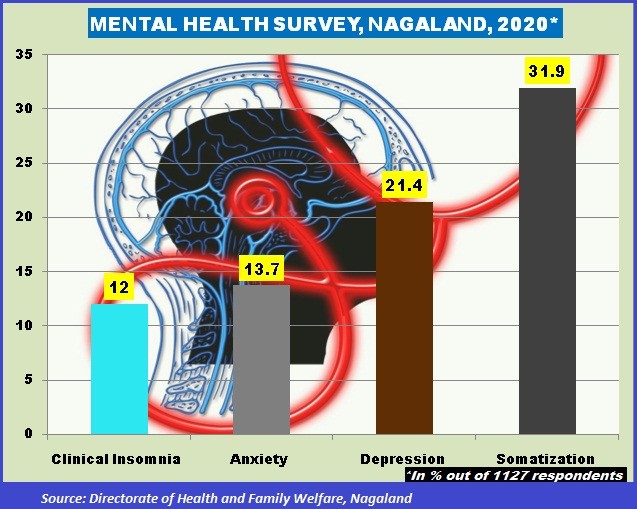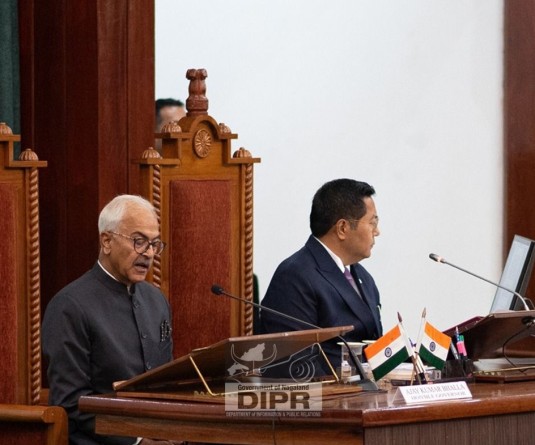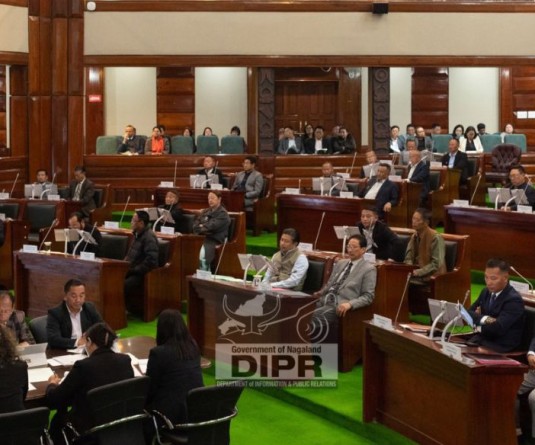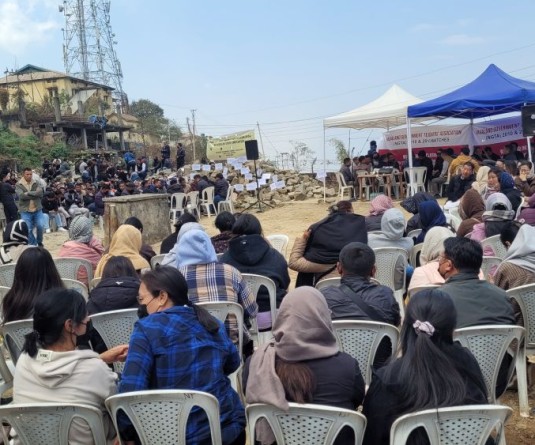Prevalence of Somatization was highest among the respondents of an online survey on mental health and psychosocial wellbeing in Nagaland during the COVID-19 pandemic conducted by Directorate of Health and Family Welfare, Nagaland. (Morung Photo)

Health department shares key findings of Nagaland Mental Health Survey, 2020
Kohima, September 17 (MExN): The prevalence of Somatization (anxiety leading to physical pain) was highest among the respondents of a survey on mental health and psychosocial wellbeing in Nagaland during the COVID-19 pandemic.
The online survey carried out from June 12 to July 15 by the Directorate of Health and Family Welfare stated that the prevalence of Somatization/Somatic symptoms (Medium, High, Very High) was 31.9%.
Prevalence of depression among the respondents was second highest at 21.4%.
The objective of the study was to assess the prevalence of Insomnia (sleep disorder), Anxiety, Depression and Somatization.
Along with standard questionnaires, the survey also used Insomnia Severity Index for Insomnia, Patient Health Questionnaire-4 for Anxiety and Depression, and Somatic Symptoms Scale-8 for Somatization.
The Fear of COVID-19 scale was used to assess the level of the phobia associated with COVID-19.
A total of 1127 respondents, over the age of 16 years participated in the survey, a release issued by Dr Vizolie Z Suokhrie, Principal Director, DoH&FW informed.
Key findings
As per the survey report, the prevalence of Clinical Insomnia (Moderate and Severe) was found to be 12%.
Prevalence of anxiety was found to be 13.7%.
Statistical analysis showed that women and respondents with high fear of COVID-19 (as per Fear of COVID score) were found to have significantly higher risk of experiencing insomnia, anxiety, depression, and somatic symptoms.
Also, people in urban areas and people who perceive to have moderate or high risk of exposure to COVID-19 at work place have significantly higher risk of experiencing insomnia, according to the report.
75% of the respondents were from urban areas. Among the respondents, 52% perceived to have low risk of COVID at workplace, 34% at moderate risk, and 15% at high risk.
While there were respondents from all the districts, majority of the respondents were from Kohima (40%) and Dimapur (35%) districts, the report said.
Depression risk groups: Frontline workers more resilient
Meanwhile, the survey report showed that people below 30 years of age, and those with educational qualification below graduation have significantly higher risk of experiencing depression.
Frontline workers (medical and non medical) who comprised 21% of the respondents in total, were reported to have lower risk of experiencing depression.
Other factors like marital status, living with family / staying alone does not significantly affect the risk of experiencing the common mental health conditions assessed in this survey, the report added.
The mean age of the respondents was 32 years while 80% of them were graduates or above.
While releasing the summary of the report, the department also added that the study was done through an online survey with limited scope which only aims to provide a baseline prevalence data of the common mental health conditions in Nagaland during the COVID-19 pandemic.
The online questionnaire was hosted at www.nagahealth.nagaland.gov.in and publicised in various media platforms, and the data was analyzed using Statistical Package for the Social Sciences (SPSS) tool.
Telephonic Counselling
Meanwhile, the Principal Director also informed that during the COVID-19 pandemic, the District Mental Health Programs under the Health and Family Welfare Department has collaborated with All Nagaland Counsellors Association (ANCA) to provide telephonic counselling services for any mental health issues like stress, anxiety, depression, etc.
One can call the Toll Free State Helpline 1800 345 0019 and choose Option 2, or send a request message through WhatsApp to 7005251298 to avail the service.






